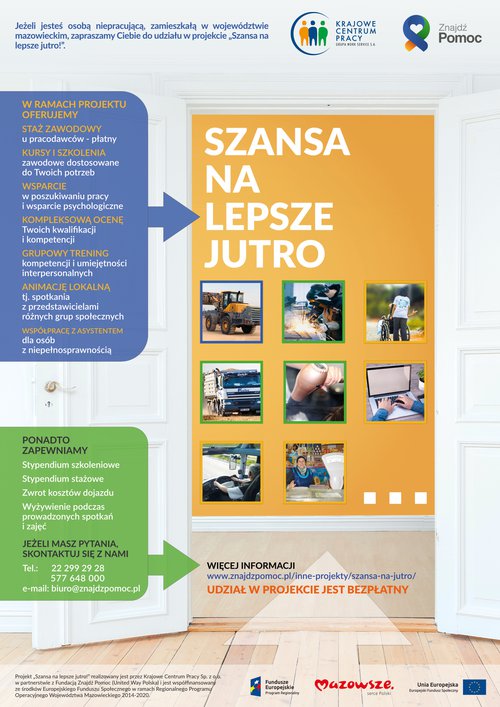
National Labor Center Sp. z o. o. and the United Way Polska Foundation implements, under axis IX Supporting social inclusion and fighting poverty, measure 9.1 Socio-professional activation of excluded people and counteracting social exclusion, a project entitled: A chance for a better tomorrow!, which aims to increase the level of activity. social and professional 380 people (228 women, 152 men) distant from the labor market, living in the Masovian Voivodeship. The activities will last from November 1, 2017 to September 2019.
The target group is 380 people:
- at risk of poverty and social exclusion,
- people with disabilities,
- unemployed people qualified for the third aid profile,
- people benefiting from the Food Aid Operational Program.
As part of the project, we plan to implement the following activities:
- professional internships and internship scholarships,
- active job search workshops,
- training and courses improving professional competences and qualifications,
- individual employment agency,
- individual career counseling,
- Individual diagnosis of participants' needs and potentials prepared by qualified specialists,
- individual psychological support in improving life competences and social skills,
- psychosocial, civic and legal counseling and conducting local animations.
It is estimated that as a result of the implementation of the "Chance for a better tomorrow!" project. 304 people (183 women, 122 men) will obtain professional qualifications, and 342 people, 206 women, 136 men, will complete a professional internship, which will bring long-term value, acquiring knowledge and skills to be used in their future work. Moreover, we estimate that 228 people (136 women, 92 men) will start looking for a job and 152 people, i.e. 92 women and 60 men, will find employment.
Total value of the project: PLN 5,231,078.60
EU contribution: PLN 4,184,862.88
Funding level:95%
Project "A Chance for a Better Tomorrow!" is implemented by National Labor Center Sp. z o. o. in partnership with the United Way Polska Foundation and is co-financed by the European Social Fund under the Regional Operational Program of the Masovian Voivodeship 2014-2020.


